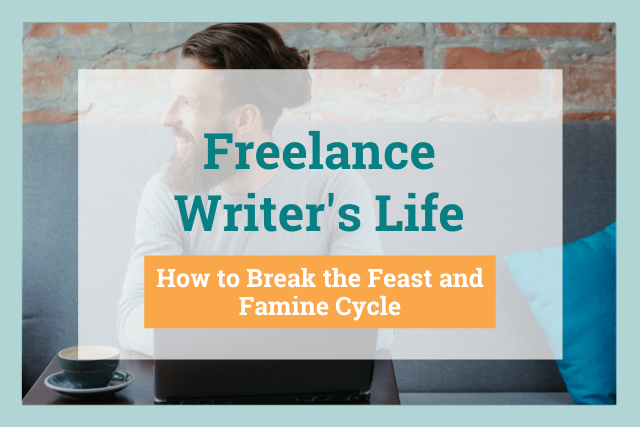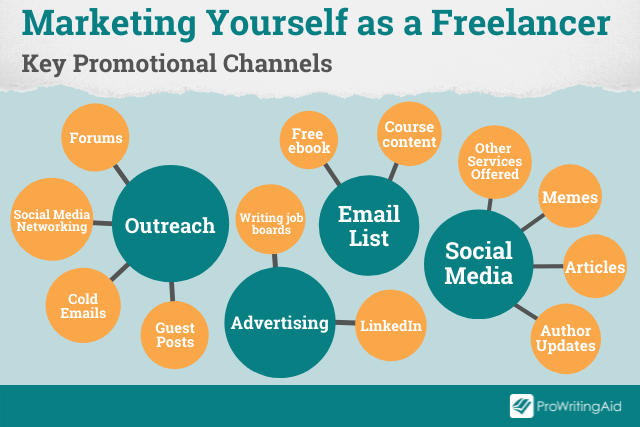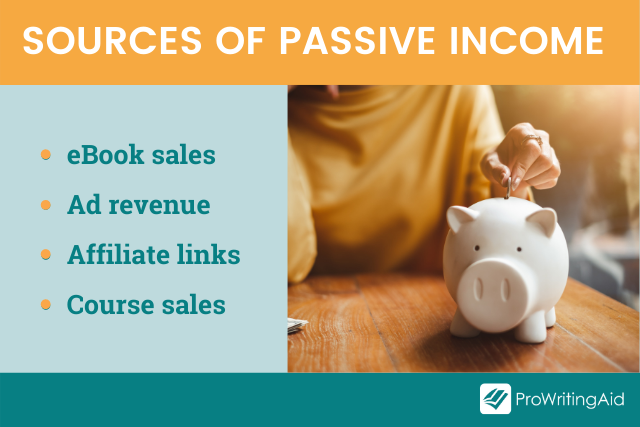
One of the reasons that many freelancers don’t stay freelancers is because of the feast and famine cycle.
You’ve heard of it before no doubt—especially if you’re a freelance writer. We’re often told that it’s just a part of life, that feast and famine is just how it is—but others will tell you that they’re constantly booked up and never without clients.
Both these scenarios can be the case. Even if you have a full schedule, chances are there’s times that you’re more booked than others—times when you have a waiting list and times when you don’t. This probably means you’ve stayed on top of marketing yourself, putting the first and most important rule of freelancing at the top of your list where it should be.
On the other hand, if you’ve experienced weeks, months, or even years without paid work, know that you’re not alone. It happens to the best of us, and it does not reflect your talent and ability as a writer (even if it feels like it does.)
- How to Avoid the Feast and Famine Cycle of Freelance Writing
- Never Stop Marketing (Even in “Feast” Times)
- Grow Your Audience So Clients Find You
- Develop Passive Income Streams with Your Side Projects
- Grow Your Savings During “Feasts” So You Don’t Suffer During “Famine”
- Use Downtime to Grow and Expand Your Services
- Freelancing Doesn’t Have to Mean a Literal Feast or Famine
How to Avoid the Feast and Famine Cycle of Freelance Writing
The truth is, there is no fool-proof plan to avoid the feast and famine cycle. Rather, you need to understand it and prepare for it. These tips aren’t going to ensure that you never go without freelance writing work again. However, they will help make sure that your “famine” doesn’t last as long—and isn’t nearly as terrifying—as it was the first time you experienced it.
The first time I experienced a serious freelance famine was about a year into my career. I had one steady, stable client that paid more than enough to live off. Everyone else provided “play” money as I looked at it. I was making more than I ever had, but I wasn’t saving any of it, and I wasn’t marketing myself at all.
Then suddenly, the start-up publication I was writing for lost funding. I went from publishing between 10 and 12 news stories a week to two, and there was no warning before it happened. One email, and almost my entire income was gone.
Since then, these are the tips I’ve learned to try and avoid these scenarios. Things don’t always go as planned, and freelancing isn’t always sunshine and roses—but for many of us it’s a dream career, so learning to roll with the feast and famine cycle and avoid it as best as possible is worth it.

Never Stop Marketing (Even in “Feast” Times)
The first and most important thing that all freelancers—not just freelance writers—need to do is never stop marketing yourself.
It’s too easy to get complacent with where you are and put marketing yourself on the back burner. Trust me, from experience, you’ll always wish you had spent more time marketing when you wind up short on clients (or rent money.)
Sometimes it can seem like there’s just not enough time in the day—which is why you have to schedule in marketing time even when you’re busy. Whether it’s half an hour a day, or an afternoon once a week, put some time into marketing before you reach the weekend, always.
This could mean reaching out to people on LinkedIn, sending cold-emails, pitching clients off job boards, or reaching out on Twitter or other social media.
Whatever your marketing method is, if it works for you, stick to it—even when you feel like you don’t need to.
Grow Your Audience So Clients Find You
This is a tip that I’m still learning to implement myself—but it’s one that I see constantly from seasoned writers. Grow your social media following and your blog audience and clients will start coming to you, rather than you having to reach out to them. It’s a long-run game with this sort of marketing, but it’s always worth it.
Not only does this help put your presence in front of prospective clients, having your own following also shows clients that you know your stuff. After all, why would all these people be following you if they didn’t want to hear what you have to say? Building authority in your industry is just as important as an individual as it is for a brand.
Whether you’re adding new connections on LinkedIn, pursuing a bigger Twitter following or trying to grow your email list, keep at it.
Develop Passive Income Streams with Your Side Projects
Again, something that I’m working my way into is developing passive income streams. Often, you can do this with side projects you already have going (a blog you don’t give enough attention to, a book you’ve been working on, a course you thought about creating, etc.). On the other hand, you may just decide to start something specifically for the passive income.
This income could be made through eBook sales, course sales, affiliate links, or ad revenue—there are plenty of ways to build a passive income. Sites like Medium allow writers to build a somewhat passive income just by posting to the platform—this way you don’t have to go through the work of setting up your own website right out of the gate.
This is money that you continue to receive even after finishing the work—like when someone buys your book or purchases a product through your affiliate link. The idea is that your income will continue to grow, long after you finished the initial work. This way, even when client work runs dry, you can fall back on this additional income.

Grow Your Savings During “Feasts” So You Don’t Suffer During “Famine”
This is the thing that will save you as a freelancer—and the thing that bit me in the butt as a new freelancer making more than I ever had in my previous work in restaurants. When you have those periods of “feast” where it seems like your work simply couldn’t run out, make sure you save some of your money.
Ideally, you’ll be able to build a safety net with two or three months of your typical salary set aside. This way, if you find yourself without work for a few weeks—or even a few months—you know you’ll have the time to find new clients without stressing about your bills.
The best way to go about this is to save more when you end up with extra projects. You know, the ones that pay more than you expected, where you suddenly start thinking about all the things you’ve waited to do when you had the money. This is when it’s the most important to prioritize—if something can wait, well, then it might be better off waiting.
Use Downtime to Grow and Expand Your Services
This last bit of advice is something I’ve done over the last year during the COVID pandemic. Use your downtime between clients to learn a new skill, generally something you’re both interested in and that can be profitable to your business. You might be surprised what doors taking some time to learn a new skill could open.
For me, that was web design. I already had basic coding knowledge and WordPress knowledge—and now I’ve got my first paying web design client creating a website for the church my dad works at.
For you, perhaps it’s learning a specific style of writing—case studies and white papers for example. This might not even mean learning a new skill, but instead focusing on another creative project you didn’t have time for before that could lead to passive income in the future, like finishing that book or course you’ve been talking about for ages.

Freelancing Doesn’t Have to Mean a Literal Feast or Famine
The one thing you should take away from this is the fact that freelance writing doesn’t have to be a literal feast or famine. You should never put yourself in a situation where you’re going to have to stress about how you’re paying your lighting bill next month or how you’re getting groceries next week.
Freelancing can bring opportunity for those who otherwise wouldn’t have it—but it can also be a struggle if you’re not prepared from the moment you make the decision to make this your career path. Consistent marketing, growing your personal audience, passive income streams, growing your skills, saving, and constant marketing is the best solution to avoid the feast and famine cycle.
Many of us—myself included—became a freelance writer to be in control of our time and income, to not be limited, and to stop living paycheck-to-paycheck. So, when opportunities arise to market yourself and grow (or save) your income, don’t hesitate. You won’t regret it when you have healthy savings and regular workflow even in slower times.

